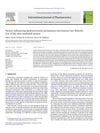 13 citations,
January 2016 in “Journal of cosmetology & trichology”
13 citations,
January 2016 in “Journal of cosmetology & trichology” Alternative treatments show promise for hair growth beyond traditional methods.
 30 citations,
January 2000 in “Dermatologic Clinics”
30 citations,
January 2000 in “Dermatologic Clinics” Finasteride and minoxidil are effective FDA-approved treatments for androgenetic alopecia.
 47 citations,
July 2014 in “European Journal of Pharmaceutics and Biopharmaceutics”
47 citations,
July 2014 in “European Journal of Pharmaceutics and Biopharmaceutics” Scientists created a gel with nanoparticles to deliver medicine to hair follicles effectively.
 25 citations,
January 2013 in “Journal of Industrial and Engineering Chemistry”
25 citations,
January 2013 in “Journal of Industrial and Engineering Chemistry” Some herbal extracts, especially when used in cubosomal suspensions, were as effective as Minoxidil in promoting hair growth.
 19 citations,
September 2020 in “Pharmaceutics”
19 citations,
September 2020 in “Pharmaceutics” Sodium Valproate nanospanlastics could be a safe and effective treatment for Androgenic Alopecia, with fewer side effects than minoxidil.
 14 citations,
April 2018 in “ACS Biomaterials Science & Engineering”
14 citations,
April 2018 in “ACS Biomaterials Science & Engineering” Nanoemulsion is a promising method for delivering luteolin to promote hair growth without minoxidil's side effects.
 16 citations,
March 2008 in “International journal of pharmaceutics”
16 citations,
March 2008 in “International journal of pharmaceutics” Different factors like pH, gel type, and chemical enhancers affect how well hydrocortisone gets into hair follicles, and less hydrated skin doesn't work well with the test method.
 48 citations,
June 2014 in “Neurobiology of Disease”
48 citations,
June 2014 in “Neurobiology of Disease” The study suggests that motor neurons created from stem cells of patients with spinal and bulbar muscular atrophy show signs of the disease, including changes in protein levels and cell functions.
 22 citations,
March 2000 in “Clinics in Dermatology”
22 citations,
March 2000 in “Clinics in Dermatology” Many treatments for hair loss lack proper testing and FDA approval, so their effectiveness is uncertain.
 15 citations,
March 2013 in “Pharmaceutical nanotechnology”
15 citations,
March 2013 in “Pharmaceutical nanotechnology” Finasteride delivery through skin improved using invasomes and iontophoresis.
 10 citations,
June 2018 in “Aaps Pharmscitech”
10 citations,
June 2018 in “Aaps Pharmscitech” The flutamide-loaded hydrogel is a promising, skin-friendly treatment for acne and hair loss, potentially requiring less frequent application.
 February 2024 in “International Journal of Research in Dermatology”
February 2024 in “International Journal of Research in Dermatology” Alcohol-free minoxidil 5% is effective and safe for treating male pattern hair loss.
 140 citations,
December 2017 in “Journal of Controlled Release”
140 citations,
December 2017 in “Journal of Controlled Release” Microneedles improve drug delivery in various body parts, are safe and painless, and show promise in cosmetology, vaccination, insulin delivery, and other medical applications.
 32 citations,
January 2008 in “Journal of Microencapsulation”
32 citations,
January 2008 in “Journal of Microencapsulation” Cosmetics with hinokitiol-loaded nanocapsules were found to effectively promote hair growth.
 25 citations,
July 2017 in “Archives of Dermatological Research”
25 citations,
July 2017 in “Archives of Dermatological Research” Herbal products might promote hair growth with fewer side effects, but more research is needed to confirm their safety and effectiveness.
 24 citations,
January 2020 in “International Journal of Molecular Sciences”
24 citations,
January 2020 in “International Journal of Molecular Sciences” Some plants with flavonoids may help treat hair loss and promote hair growth.
 22 citations,
November 2008 in “International Journal of Dermatology”
22 citations,
November 2008 in “International Journal of Dermatology” A mix of 5-aminolevulinic acid and iron ion can speed up hair growth.
7 citations,
December 2021 in “Pharmaceutics” The nanoemulsion with garlic oil, apple cider vinegar, and minoxidil could effectively treat alopecia areata.
 1 citations,
July 2017 in “Global journal of pharmacy & pharmaceutical sciences”
1 citations,
July 2017 in “Global journal of pharmacy & pharmaceutical sciences” A new hair loss treatment was created using minoxidil and tretinoin in stable niosomes, which effectively released the drugs over time.
 January 2020 in “Elsevier eBooks”
January 2020 in “Elsevier eBooks” Plant-based chemicals may help hair growth and prevent hair loss but need more research to compete with current treatments.
 153 citations,
October 2012 in “Skin Pharmacology and Physiology”
153 citations,
October 2012 in “Skin Pharmacology and Physiology” Caffeine in cosmetics may reduce cellulite, protect skin, and stimulate hair growth, but more research is needed on its use and effects.
 59 citations,
January 2015 in “Nanoscale”
59 citations,
January 2015 in “Nanoscale” The new micelle formulation delivers acne treatment more effectively and safely than current gels.
1 citations,
October 2022 in “Bioengineering” Keratin helps skin cells mature when added to a collagen mix, which could be important for skin and hair health.
 4 citations,
July 2023 in “Pharmaceutics (Basel)”
4 citations,
July 2023 in “Pharmaceutics (Basel)” Nanoparticle-based drug delivery to hair follicles is more effective when tested under conditions that match skin behavior.
 4 citations,
April 2012 in “Asian-australasian Journal of Animal Sciences”
4 citations,
April 2012 in “Asian-australasian Journal of Animal Sciences” Red deer antler extract may help hair grow faster by increasing a growth protein.
2 citations,
December 2021 in “Pharmaceutics” Finasteride-loaded proniosomes effectively promote hair growth in mice.
1 citations,
December 2022 in “Bioactive Materials” The microneedle patch with quercetin, zinc, and copper effectively promotes hair regrowth for androgenic alopecia.
1 citations,
April 2022 in “Journal of Ayurveda and integrative medicine” Blumea eriantha DC extract shows strong potential for promoting hair growth.
 November 2024 in “Plants”
November 2024 in “Plants” Et-BB3-CMU rice bran extract may be a promising natural option for promoting hair growth and preventing hair loss.
 2 citations,
January 2023 in “BioMed Research International”
2 citations,
January 2023 in “BioMed Research International” Beetroot extract nanogel may help treat hair loss caused by testosterone.

























